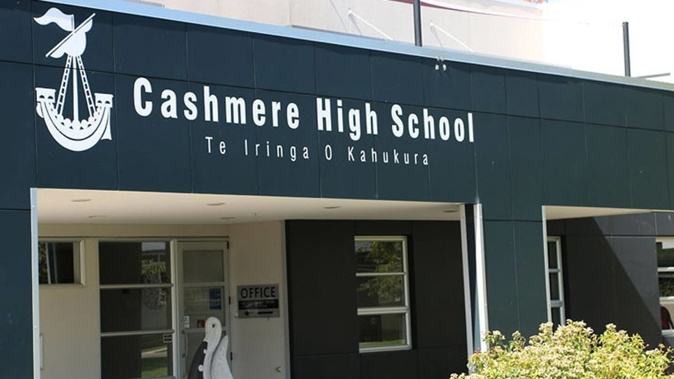
New Zealand’s top watchdog has named and shamed two schools for refusing to apologise to students, saying he’s concerned some schools are failing to act fairly and he could raise the matters with the Prime Minister.
Chief Ombudsman Peter Boshier investigated complaints from parents of children at Auckland’s St Peter’s College and Christchurch’s Cashmere High School.
The first student, a Year 11 pupil at St Peter’s College, admitted buying marijuana as part of an alleged drug trade at the school and was later among a number of students excluded or hit with disciplinary action.
The school’s board said the student’s behaviour had been a “gross misconduct”.
However, Boshier found St Peter’s board did not properly record how it arrived at its decision. He consequently decided they acted unreasonably and needed to apologise to the student and family. The school refused.
The second case involved a student with disabilities, who was refused out-of-zone enrolment at Cashmere High School.
Despite the student’s older siblings already going to the school and the family earlier living in its in-zone, Boshier found the school had followed its enrolment policies and therefore had not acted unreasonably.
However, it had failed to properly explain its decision to the family. He told the school to apologise to the family, which it refused to do.
“It is very disappointing when boards fail to see my recommendations as an opportunity to learn from their mistakes and improve their processes and decision-making,” Boshier said.
“What’s even more unfortunate is that failure by a school board to accept my recommendations reflects badly on the school as a whole.”
Boshier said parents in tough situations typically wanted to feel they had been heard and treated fairly by school boards.
School boards were like other government organisations and must act transparently and fairly, he said.
As the nation’s top watchdog, set up to investigate complaints levelled against government organisations, his role came with special powers, he said.
“When my recommendations are not complied with, ultimately I can escalate my concerns to the Prime Minister and Parliament. I can ask them to examine the situation and decide what further action to take,” Boshier said.
“But I shouldn’t need to do this. I expect that when I make recommendations, they are complied with. The vast majority of boards do this, so it is very disappointing when some do not.”
In the case of St Peter’s College, Boshier’s investigations found the school’s board had not properly recorded in writing its deliberations about how best to discipline the Year 11 student.
That meant it was not clear what steps and factors the board had considered, and whether it had followed or steps as set out by the law, Boshier said.
By contrast, the board did record these details in discussions about other suspended students, he said.
As a result, Boshier found the school board had acted unreasonably in suspending the student and needed to apologise to the student and their family.
It also needed to better record its deliberations during future student suspension meetings.

Chief Ombudsman Peter Boshier says he can escalate complaints to Parliament or the Prime Minister if government organisations do not follow his recommendations. Photo / File
The school board told the Ombudsman it would follow his recommendations about future meetings but would not be apologising.
In the case involving the student wanting to enrol at Cashmere High School, the pupil’s older siblings were already going to the school.
The family had previously been living in Cashmere High’s zone, but “due to factors outside of their control” had to move to a different area.
They had assumed that when the pupil graduated from intermediate school, they would be able to enrol out-of-zone at Cashmere High because the student’s siblings were already there.
When they were refused, the family wrote to the board explaining the student’s disability and circumstances.
They said they were concerned the student “would be socially and emotionally disadvantaged if they could not attend the school with siblings and friends from intermediate school, upon whom they relied for support”.
However, Cashmere High’s board said they could not fit any more out-of-zone students, and had been repeatedly urged by the Ministry of Education not to do so.
The board said the family should instead ask the Ministry of Education to write a letter stating the student must be enrolled at the school.
Boshier found the school board had not acted unreasonably by refusing to enrol the student.
However, the way the board communicated this with the parents was unreasonable, he said.
“The board didn’t explain the basis for its decision nor did it outline the factors it considered beforehand. This made the parents feel like they hadn’t been listened to. They were unsure whether the board had considered the factors they put forward in their letter,” he said.
“There were also issues with the board’s record-keeping. It is vital that proper records of a decision-making process are kept to make sure they are transparent and are accounted for. Like other government agencies, school boards must comply with the Public Records Act.”
Boshier recommended the board write a comprehensive apology to the parents and take appropriate steps to make sure its members were aware they needed to properly explain the basis for their decisions.
The board has refused to implement the recommendations.
“No one likes it when their children get into trouble, but if they find themselves in that difficult situation, parents need to be sure that school boards are going to do the right thing,” Boshier said.
Take your Radio, Podcasts and Music with you









